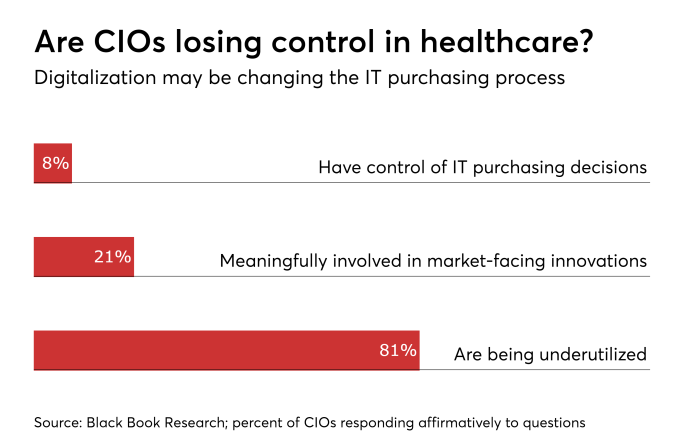The role of chief information officer in the healthcare industry is changing rapidly, and in some cases dramatically, according to a survey from Black Book Research of health information technology leaders and non-IT hospital leaders.
Last year, IT leadership roles were evolving from providing infrastructure, applications and analytics support into being an overall strategic business leader. But as enterprisewide initiatives have largely been implemented, smaller health IT programs are growing at the departmental levels with departmental management gaining a voice in making IT purchase decisions.
“Traditionally, CIOs called the shots in IT purchasing after aligning with the department on its need, but digitalization is making a permanent change to the IT purchase process,” contends Doug Brown, managing partner at Black Book. “As healthcare organizations transform work processes through digitalization the department leaders involved must logically uphold authority of those processes.”

For example, CIOs controlled 71 percent of HIT purchasing decisions in 2015 and today that stands at 8 percent, Black Book research indicates. In its 2018 survey, only 21 percent of CIOs say they believe they were meaningfully involved in market-facing innovations and strategic departmental IT selections.
Further, CEOs are casting a different light on their CIOs, as more than a quarter of surveyed CEOs view the CIO as being tactical but not strategic enough to navigate the business systems to drive financial success.
Nearly 90 percent of surveyed C-suite executives see the CIO as a technologist and not a source of innovation to deliver business value. “In other words, they leverage technology but they don’t deliver it,” Brown explains.” Conversely, 81 percent of CIOs identify themselves in a transformational CIO role and are being underutilized, despite what other colleagues may perceive.
Also See: CIOs must take charge in implementing artificial intelligence governance
The level to which CIOs are left out of the IT purchasing loop has increased significantly since 2016, and 90 percent of CIOs in the new survey report having been bypassed by departmental managers when making technology investments this year. That compares with 17 percent only two years ago.
CIO interactions with the board also have sharply decreased, according to survey results—and quickly. In 2017, 64 percent of CIOs communicated directly with boards on enterprisewide and high-dollar purchases. Now, that figure is 39 percent.
CIOs commenting on the report noted that nuances between their ability to lead and influence change, rather than just managing IT purchasing decisions.
“I find the wording interesting,” says Roland Garcia, senior vice president and chief information officer at Baptist Health in Jacksonville, Fla. “It is not about power but rather the ability to lead and be a change agent in support of the organization’s mission. It is not about technology, but rather how do we use technology to further the mission of the organization and help those who care for our patients do it in a better, more efficient, comprehensive and safe way.
“There may be some CIOs out there who have not been able to make the transition from a technologist to a healthcare executive,” Garcia continues. “In those instances, I can see where their focus may be limited to managing technologies, using technologists’ terms and buzz words, or limiting the organization’s ability to move forward because their focus primarily is on managing of the said technology. In my opinion, this position would not be viewed by the executive suite as an executive level role with strategic visioning who understands the core business.”
However, Todd Richardson, senior vice president and CIO at Aspirus, an eight-hospital delivery system serving parts of Wisconsin and Michigan, says he disagrees with the survey findings.
“In the past, CIOs may have been able to make the sole decisions with technology, but as this becomes more invasive in all of our business lines, it is incumbent upon us as CIOs to partner with operational leaders in these decisions since they dramatically impact the business.
“If anything, it has become more strategic and requires a tremendous amount of forethought and planning to determine where the business is going and ensure that the infrastructure, policies and systems are in place to support organizational direction. In addition, technology is changing more rapidly than ever and there are any number of ‘Bright Shiny Objects’ that people want to chase. Given the security concerns, the CIO is essential in establishing the guiding principles and providing input and direction.”
Information on Black Book’s research is available here.
